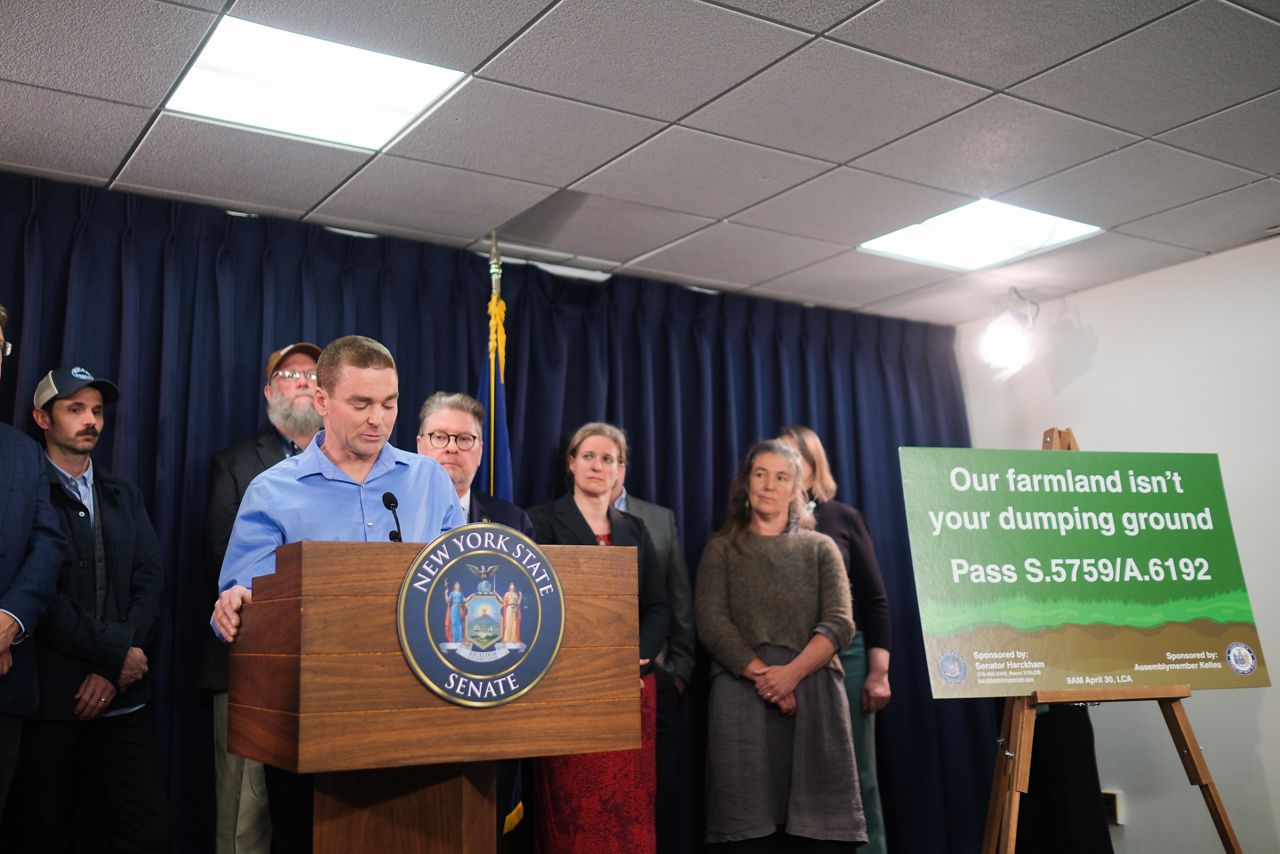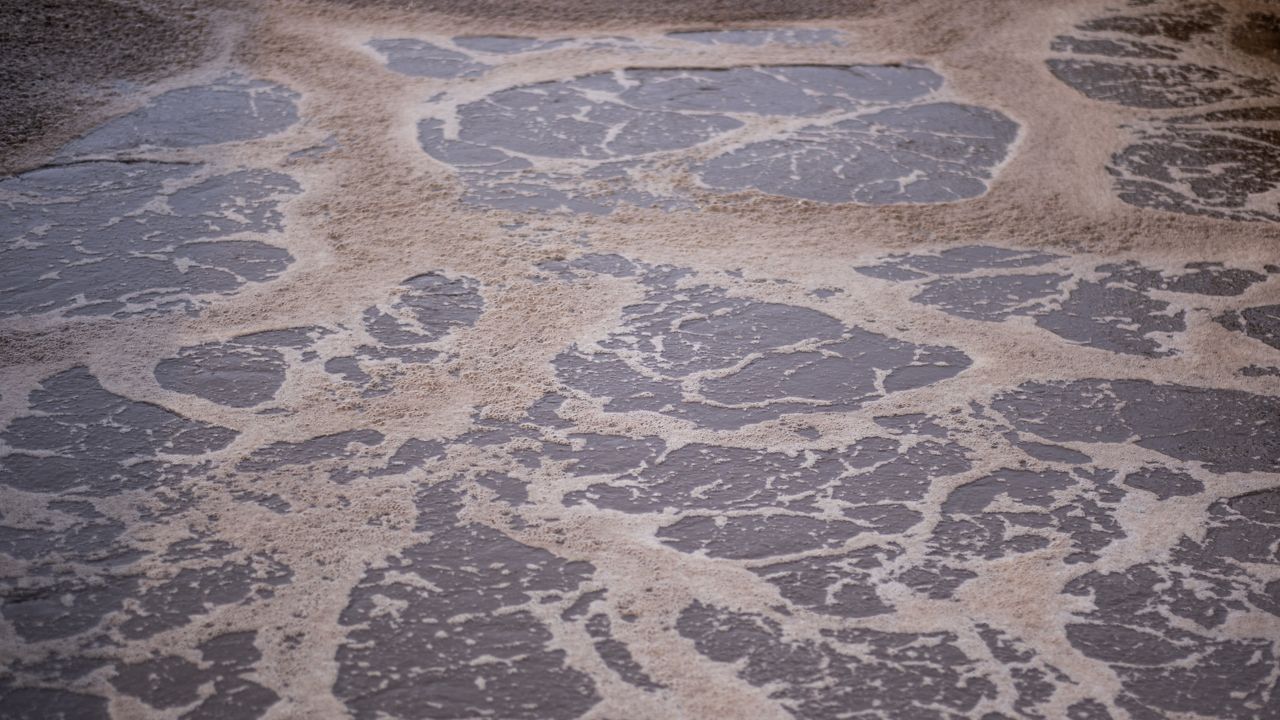New York lawmakers introduced legislation Wednesday that would put a five-year moratorium on the spread of biosolids on farmland, a practice experts and homeowners say is to blame for harmful chemicals leeching into groundwater.
Ryan Dunham, a resident of New Scotland, lives across the street from a farm field that spread manure and other fertilizers for years. However, he says last summer they switched to using biosolids, which the Albany County Health Department confirmed.
“We noticed a smell first. It smelled like rot, like something had died. It was disgusting, and overpowering and it lingered for weeks,” Dunham said. “We had to shut all of our windows, and for two weeks in the middle of July, my kids didn’t want to play outside, and my neighbors talked about moving.”
Shortly after the biosolids were spread, Dunham said he heard his daughter yelling from the bathroom.
“When I opened the door, I saw the water coming from the show head was brown and had a foul, sour, rotten stench,” he said.
The Albany County Health Department tested his 325-foot well, which tested positive for E.coli and coliform at levels 200 times what is considered safe by the Environmental Protection Agency, Dunham said. Six of the 10 neighbors’ wells also tested positive for the bacterium. This prompted Dunham to research biosolids, and he discovered the increased rates of PFAS in the sludge that have contaminated land in states like Maine.
“When my 11-year-old daughter is singing Taylor Swift in the shower, I think about forever chemicals. I think about heavy metals. I think about what she might be ingesting inside of her body, and I think about later in life, will she develop health problems like kidney failure or cancer?” Dunham said.
Per- and polyfluoroalkyl substances, also known as forever chemicals, have been linked to health issues such as increased rates of cancer, reproductive and fertility impacts, developmental delays in children, and a reduced ability for the body’s immune system to fight infections, according to the EPA.
State Sen. Peter Harckham, a Democrat from Westchester, and Assemblywoman Anna Kelles, a Democrat from Trumansburg, sponsored the legislation.
“This commonsense legislation does a couple of things. It establishes a five-year moratorium on spreading biosolids on land, requires permit holders for biosolid use to test for PFAS in groundwater and soil, and wastewater treatment facilities will have to test for PFAS as well. The bill will also help farmers whose land may be affected by PFAS,” said Harckham.
Additionally, it would establish the biosolids task force and the PFAS agricultural response program.
“Inevitably, when you are spreading biosolids, you are also spreading those [toxic chemicals]. Those chemicals are then picked up by the plants, so they are in our food supply, which are then consumed by us,” Kelles said.

Some municipalities have taken action.
Albany County recently extended their 90-day moratorium on biosolids usage to October; the Steuben County towns of Thurston and Cameron also passed their own moratoriums in the past couple of years.
New Scotland Town Supervisor Douglas LaGrange, a former dairy farmer, said using biosolids, a fertilizer approved by the EPA and DEC, has financial incentives at a time of increased costs for the agriculture industry.
“We’re in a position with the financial situations in agriculture today of going from issue to issue, and trying to put out fires continuously, so if somebody comes to me and says, ‘I’ve got this EPA and DEC approved fertilizer that’s a fantastic nutrient adder to your soil, plus, I can either sell it to you cheaper than fertilizer, I’ll give it to you, and I may even pay you to take it.’ That’s a no-brainer,” LaGrange said.
But what these farmers didn’t know was the untended impact of the sewage sludge on their land, crops and livestock, he said.
“Farmers care about their land. We eat and drink from the land that we work. We don’t want to poison it. It’s not the farmers that are doing this, it’s these big companies,” LaGrange said.
“We don’t want a situation where farmers are unfairly targeted because they have followed advice and have spread biosolids in the past,” Kelles said.

The Department of Environmental Conservation has said their strategy is to reduce PFAS at the source by banning them from certain products.
Reps. Mike Lawler (R-NY-17) and Pat Ryan (D-NY-18) proposed federal legislation that would prohibit the procurement by federal agencies of products with two specific types of PFAS— PFOA and PFOS.
New York leaders have said they have plans to increase the use of sewage sludge by 57% by 2050 to lessen how much is going to landfills. However, the EPA released a draft risk assessment in January that said there are increased health risks especially for people living on or near sites where sewage sludge has been used.
“This is driven by all the folks behind us, the farmers, the environmentalists, the local officials who are impacted by this,” Harckham said. "You will hear the urgency of why we need to get this done in this session. We need to get it done now. Let’s protect our farmers. Let’s protect our fragile drinking water supplies."
- Sewage sludge ‘poisoned’ drinking wells in Steuben County
- PFAS and you: A look at how ‘forever chemicals’ impact people
- Solving the complex PFAS problem
- Sludge spreading raises liability concerns, fertilizer questions for farmers
- 5 takeaways from the Spectrum News 1 sewage sludge investigation
- 'Suffering the consequences': Why Maine banned sewage sludge spreading and how farmers are adjusting
- 'Don't spread on me': Steuben County neighbors clamor for a ban on speading sewage sludge
- Why New York plans to double sewage sludge spreading as EPA issues health risk


